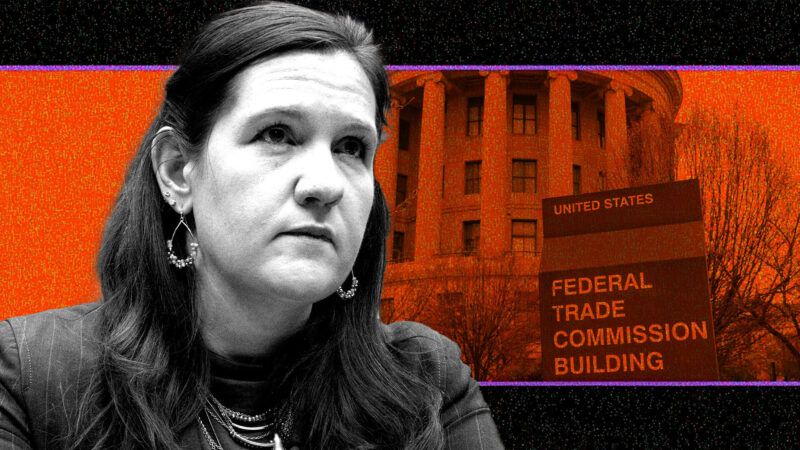Federal Judge to Trump on FTC Commissioner Firing: No, You Can't Fire Whomever You Want
The ruling upholds protections afforded to officers of the "quasi legislative or quasi judicial agencies" created by Congress.

The U.S. District Court for the District of Columbia ruled that President Donald Trump's March firing of Federal Trade Commission (FTC) Commissioner Rebecca Kelly Slaughter was illegal on Thursday. The ruling not only reinstates Slaughter at the commission but also strikes a blow to the Trump administration's arguments that senior officials of independent agencies serve at the pleasure of the president and may be removed at his discretion.
FTC Chair Andrew Ferguson said he had "no doubts about [the president's] constitutional authority to remove Commissioners" following Slaughter's and Commissioner Alvaro Bedoya's March expulsions from the commission. Apparently, Ferguson's confidence was misplaced.
The court dismissed Bedoya's claims that his firing was illegal, ruling they were moot after he formally resigned from the commission in June to lawfully pursue outside employment—something FTC employees are prohibited from doing while in office. However, the court ruled in favor of Slaughter, declaring that her "purported removal…was unlawful under the Federal Trade Commission Act…and is therefore without legal effect." In case there was any uncertainty about the recognition of Slaughter's commissionership, the court declared she "remains a rightful member of the Federal Trade Commission until the expiration of her Senate-confirmed term on September 25, 2029."
The court also ruled that Ferguson, FTC Commissioner Melissa Holyoak, and FTC Executive Director David Robbins may not interfere with Slaughter's performing her lawful duties as an FTC commissioner "unless she is lawfully removed by the President for 'inefficiency, neglect of duty, or malfeasance in office,'" according to the Federal Trade Commission Act.
This ruling should come as no surprise, given Supreme Court precedent. In 1935, the Court ruled against the firing of FTC Commissioner William E. Humphrey, reasoning that then-President Franklin Delano Roosevelt was not free to fire officers of "quasi legislative or quasi judicial agencies" created by Congress without cause.
Indeed, neither Bedoya nor Slaughter were removed for inefficiency, neglect of duty, or malfeasance but for the reason that their "continued service on the FTC is inconsistent with [the Trump] Administration's priorities," as expressed in identical emails sent to Bedoya and Slaughter from Deputy Director of Presidential Personnel Trent Morse on Trump's behalf. Trump cited his Article II powers to remove the democratically appointed commissioners, but the court's memorandum opinion states that, per Humphrey's Executor v. United States, "the FTC Act's removal protections for FTC Commissioners did not violate Article II."
Citing United States v. Hatter (2001), the court opinion states that only the Supreme Court can overrule its precedents and that, accordingly, "the court cannot, and will not, fulfill [defendants'] request" to "bless what amounts to the implied overruling of a ninety-year-old, unanimous, binding precedent." It is likely that Slaughter v. Trump will make its way to the Supreme Court; the Trump administration has already appealed to the D.C. Circuit Court of Appeals and requested a stay of the lower court's order pending this appeal.
The Supreme Court in Humphrey's Executor ruled that "Congress '[un]doubted[ly]' had the power to create quasi-legislative or quasi-judicial agencies and instruct them to act 'independently of executive control,'" according to the district court. Nowadays, legal scholars harbor serious doubts about Congress possessing the power to delegate "All legislative powers…vested in a Congress of the United States," by Article I of the Constitution.
The New Civil Liberties Alliance, a nonprofit civil rights group that aims to protect constitutional freedoms from violations by the administrative state, argued in a December 2019 amicus curiae brief that the existence of such agencies violated the separation of powers: "The Constitution…makes no provision for 'quasi-legislative' or 'quasi-judicial' powers, and it makes no allowance for independent agencies to wield those powers at the expense of Congress or the federal judiciary."
This is an issue that the Supreme Court may have to rule on in its next term, which begins in October. For the time being, the judiciary has delivered a blow to Trump's idea that he can fire anyone he wants.
